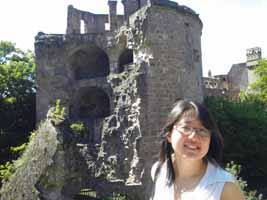 Assistant Professor of Art History and Asian and Asian American Studies
Assistant Professor of Art History and Asian and Asian American Studies
Fine Arts Building –
Phone: (860) 486 – 4473
Email: Yan.Geng@uconn.edu
Professor Geng has returned from Munich, Germany where she was on leave, Academic Year 2014-2015, as Goethe Postdoctoral Fellow.
Assistant Professor of Art and Art History and Asian and Asian American Studies Yan Geng officially joined our faculty in fall 2013, after a rigorous international search. Her manuscript (which was based on her doctoral dissertation) is tentatively titled Mao’s Image: Art and Politics in the Early People’s Republic of China, and represents a significant intervention with regard to the relationship between propaganda, art-making, and artistic resistance. Focused on the ways in which artists trained during the Republic of China period (1912-1949) were faced with particular challenges during the initial years of the People’s Republic of China (1949 – 1954), Mao’s Image is less about propaganda as strictly politicized aesthetic and is more about how these individuals at times challenged and at other times conformed to the demands of the nascent nation-state. While Mao’s Image is on the one hand intimately concerned on the ways in which state dictates about art attempted to codify a new sense of Communist nationhood, it is on the other hand rightly attuned to individual and regional aesthetic sensibilities which were concomitantly in flux. The manuscript also considers by way of multiple media the degree to which artists often subversively engaged specific representations that acknowledged the pre-Communist past. Divided into a series of provocative case studies, Mao’s Image will contribute greatly to the fields of Asian Studies, Asian Art History, and Modern Chinese Art. Since the initial version of the manuscript, Professor Geng has worked tirelessly to revise the piece for publication.
In addition to this manuscript and postdoctoral fellowship, Professor Geng has two pieces forthcoming (a peer-reviewed article and an encyclopedia entry). She also has a piece published in The Challenge of the Object: Proceedings of the 33rd Congress of the International Committee of the History of Art. She has received a grant through the School of Fine Arts Dean’s and the Scholarship Facilitation Fund; these funds will be used to continue the archival work for her second project: Space, Power, and Memory: China’s Socialist Art and Architecture in Transcultural Perspective.
Whereas Professor Geng’s first project is specifically focused on China (geospatially) and the early People’s Republic of China (temporally), Space, Power, and Memory is much more internationalist with regard to its archive, which includes architectural sites in the former Soviet Union (Russia), Japan, and China. Intersecting with current trends in memory studies, which evocatively engage the ways in which the monuments and memorials instantiate potent debates about the past within the ever-shifting context of the present, Professor Geng’s second project is both transcultural and transnational. Invested in mapping the movement of ideas, people, and capital across borders and regimes, Space, Power, and Memory renders visible the degree to which strategic remembrance works in tandem with tactical forgetting.